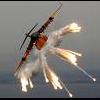Yeah, don't get me wrong, I am a big proponent of educated officers. I have ranted and raved in other threads about the f'd up AF education process. The check the box system the Air Force has now and the limited opportunity for ops folks to get a prestigious degree is insanely short-sighted. A lot of my peers are getting out of the Army at this point (I was a cross-commissioner) and cruising into Harvard, U of Chicago, Dartmouth etc...Further, the Army has programs very early in careers to send folks back to get masters degrees at good schools. Also, teaching at West Point is considered a good career move unlike teaching at USAFA for AF pilots. So, while our peers are out getting great degrees, the Air Force flying community is stuck getting online degrees and wondering if TUI is going to keep their accredidation. Yes, I know that one could argue that pilots don't necessarily need prestigious degrees, but do infantry officers need these degrees? No..but the other services seem to have a better grasp that educating their officers and building more credentialed individuals is an investment into the profession and ensuring military officership is considered elite...The Air Force tends to boil everything down to technical necessity...This is bullshit because educating people (outside of AFIT and Maxwell) expands people's horizons and builds more thoughtful, perspective-rich decision-makers.
Now, off that soap box....there is a fundamental problem with the "pay to play" promotion process. Essentially, it fosters an environment where people knock out a degree out of necessity rather than for the actual interest in knowledge. Further, how do we measure this? So, I chose to use my GI Bill and TA to get a MBA at a reputable school. I did it for me and future options, but does that mean the Air Force should favor me more than someone that got a check the box? What I say, and I actually briefed this at SOS, is we should eliminate the "requirement" to get a masters before Major promotion. Eliminate TA altogether for O's. During the Capt years, people are assessed based on technical skills and leadership potential alone. When the most talented folks are selected for IDE in residence, then the Air Force should have a much broader selection of schools outside of the military education structure. These should include top-tier civilian schools. This serves 3 main purposes. First, it is a carrot to keep people in. Second, it broadens horizons for military leaders. Third, it reduces wasteful education spending (i.e. TA on for profits) and replaces it with real, worthwhile education.





